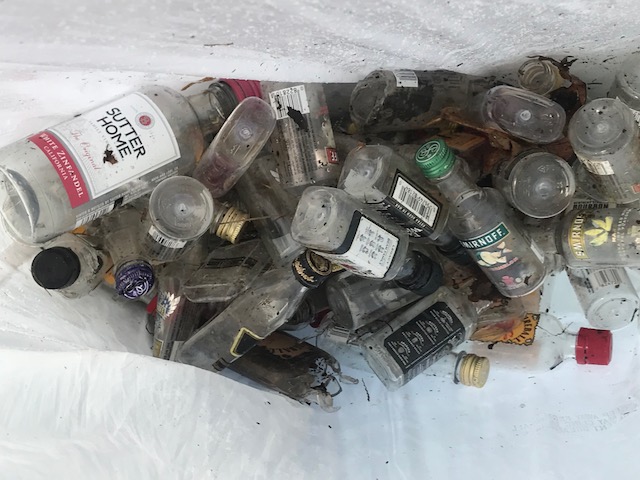A bill making its way through the state legislature proposes adding a five-cent deposit fee to miniature liquor bottles in an effort to curb roadside litter.
The bill, if passed, would add miniatures—bottles holding 100 milliliters or less of alcoholic beverages—to the state’s beverage deposit law. Enacted in 1982, that law, more commonly known as the bottle bill, adds a five-cent surcharge to soda, beer, malt beverage, and mineral and sparkling water containers. Containers brought to retailers or redemption centers are worth a nickel each to the consumer who takes the time to redeem them.
The bill, designated H.3528, was filed in January 2017 by Randy Hunt, a Republican member of the state House of Representatives representing the 5th Barnstable district, and thirty co-sponsors.
Both the House and Senate referred the bill to the committee on Telecommunications, Utilities and Energy. A joint hearing on the bill took place in June 2017. In March 2018, the committee reported favorably on the bill and referred it to the House Ways and Means Committee, where it now sits with over 600 other bills awaiting their fates.
In a June 2017 press release, Representative Hunt said that the primary objective of the bill is to generate dialogue on littering by proposing a policy prescription to help reduce it. He focused on miniatures, known colloquially as “nips.”
“I hope that by wielding this legislation, we can also kick-start deeper conversation on the issues of underage drinking and driving under the influence,” said Rep. Hunt, “as nips are frequently associated with those societal concerns.”
The bill has broad support from environmental groups
Take even a short walk around Medway or Millis, and you’re bound to come across at least one discarded nip. Or, in some places, many more. Residents who’ve worked to clean up roadside trash have snapped pictures of trash bags holding dozens of the tiny bottles. In fact, on Millis Beautification Day, sponsored by the Millis Lions Club and the Millis Garden Club, so many nip bottles were picked up that it prompted Bill Lawson, organizer of the event, to contact Rep. Shawn Dooley about supporting a 5-cent deposit to discourage litter.
At first blush, the idea of adding miniatures to the bottle bill is a sound one. After a few fits and starts, the state’s bottle bill significantly reduced litter and added a new income stream to residents, businesses, and states. Unclaimed deposits go to the state’s general fund, redemption centers get a cut of each deposit, and residents who take the time to collect and redeem containers get a nickel per bottle or can.
Peter Harkey of Harkey’s Wine & Spirits in Millis had a positive initial reaction when learning about the bill. “A brilliant idea at first glance,” he said, “especially after any technological and process challenges are solved.”
Harkey and a few of his customers kicked around a few of those potential challenges, which could turn a seemingly simple idea into a complex one. Would manufacturers have to provide separate labels for containers sold in the state? What about miniatures purchased in other states but redeemed in Massachusetts? Can all of the current redemption machines handle bottles the size and weight of miniatures, or read the tiny barcodes?
Messages to several liquor titans, including Smirnoff, Crown Royal, and Pernod Ricard, were not returned.
Dave D’Amico, the head of the Medway DPW, said, “I can’t speak to the logistics of the deposits or returns, but I’ve had several interesting conversations about roadside trash with residents. The single most mentioned item they find in the roadside gutter is nip bottles. This is primarily with people who live on the main roads going through town. Some of these inevitably wind up in the storm drain system. Given that we are a small, rural town, much of our storm water and the trash it collects goes directly to streams, wetlands, and the Charles River. So, these bottles are at a minimum a nuisance and potentially a broader ecological problem state-wide.”
Jim McKay, head of the Millis DPW, agrees. “When we run the town-wide cleanups each year, the biggest complaint is the number of nip bottles we find,” he said. “Hundreds and hundreds of them. When we mow, they jam up the mowers. They’re everywhere.”
Richard Winslow, who runs Winslow Spirits & Things in Brewster, isn’t convinced that attaching a redemption to miniatures would decrease roadside litter. “The people who throw the empty miniatures out of their car windows aren’t going to care about the redemption. They’re trying to not get caught with the empties by the police, their parents, or their husband or wife,” he said.
Redemption rates have fallen in recent years, perhaps due to the increase in and ease of home and municipal recycling. In 2010, nearly 71 percent of bottles were redeemed, but by 2017, that rate had fallen to 56.8 percent. Consumers may prefer the ease of recycling their bottles and cans over losing a nickel per container.
Every bottle and can recycled or redeemed means one less bottle or can that could end up in a landfill or the side of the road. Perhaps Representative Hunt is right—that merely drawing attention to the issue will have a positive impact on litter, underage drinking, or both.
“I wish doing the right thing was incentive enough for people,” said Dave D’Amico, “but sometimes a little extra motivation might be needed.”

Issue Date:
August, 2018
Article Body:
